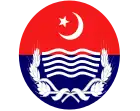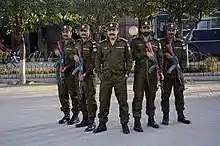Law enforcement in Pakistan
Law enforcement in Pakistan (Urdu: ادارہ ہائی نفاذِ قانون، پاکستان) is one of the three main components of the criminal justice system of Pakistan, alongside the judiciary and the prisons.[1][2] The country has a mix of federal, provincial and territorial police forces with both general and specialised functions, but the senior ranks of all the provincial forces and most of the federal ones are manned by members of the Police Service of Pakistan (PSP). The PSP is one of the most prestigious parts of the Central Superior Services, Pakistan's main civil service organisation.[1][2][3] Federal law enforcement agencies are generally overseen by the Ministry of Interior of the Government of Pakistan, while provincial police forces are overseen by a department of the government of that province.
Federal police agencies
Civil Armed Forces
- Airports Security Force (40,000 personnel)
- Anti-Narcotics Force (80,000 personnel)
- Frontier Corps (300,000 personnel)
- Frontier Constabulary (100,000 personnel)
- Gilgit Baltistan Scouts (88,000 personnel)
- National Highways and Motorway Police (140,000 personnel)
- Pakistan Coast Guard (33,000 personnel)
- Pakistan Railways Police(180,000 personnel)
- Punjab Rangers and Sindh Rangers (400,000 personnel)
- Pakistan Customs (100,000 personnel)
- Pakistan Maritime Security Agency (30,000 personnel)
- Pakistan National Guard (200,000 personnel)
- Azad Kashmir Scouts (100,000 personnel)
Police
- Islamabad Police (14,000 personnel)
- Balochistan Police (150,000 personnel)
- Khyber Pakhtunkhwa Police (200,000 personnel)
- Gilgit-Baltistan Police (50,000 personnel)
- Azad Kashmir Police (80,000 personnel)
- Sindh Police (280,000 personnel)
- Punjab Police (350,000 personnel)
Provincial and territorial police


The four provinces of Pakistan (Punjab, Khyber Pakhtunkhwa, Sindh and Balochistan) each have their own police force, organised to suit the challenges of that locality, with their own specialised and elite units. Each police force has a Commissioner of Police appointed as Inspector-General who is a senior officer from the Police Service of Pakistan.[4] Some provincial police forces are routinely supported by federal paramilitary units operating in that area. All provincial police forces contain a Counter Terrorism Department.
The traditional uniform of Pakistani provincial police officers is a black shirt with tan trousers. In 2017, police in Punjab transitioned to an olive green uniform, but reverted to the traditional uniform in 2019.[5] In 2020, all provinces decided to adopt the uniform worn in Islamabad - light blue or white shirts with dark blue trousers.[6]
Balochistan
- The Balochistan Police (38,000 personnel) operates in 7 districts of Balochistan province.[7]
- The Balochistan Levies (23,000 personnel) is a paramilitary police force operating in 23 of Balochistan's 30 districts.[7][10][11]
Khyber Pakhtunkhwa
- The Khyber Pakhtunkhwa Police (83,000 personnel) is the main civilian police force in Khyber Pakhtunkhwa province.[12]
- The Reserve Frontier Police (10,000 personnel) acts as the reserve unit of the KP Police.
- The Special Combat Unit is for counter-terrorism operations.
- The Khasadar Forces are tribal security forces operating throughout the former tribal areas, now part of Khyber Pakhtunkhwa.
- Khyber Pakhtunkhwa Levies (11,739 personnel)[13] are raised by provincial or local governments to provide additional security in their areas. They include:
The Levies and the Khasadar Forces will be absorbed into the Khyber Pakhtunkhwa Police.[14]
Punjab
- The Punjab Police (180,000 personnel) operates in the Punjab province.[15]
- The Dolphin Force deals with street crime.
- The Elite Police performs counter-terrorism operations.
- The Police Qaumi Razakars are a support force for the Punjab Police in their duties.[16][17]
- Punjab Prisons manage 43 prisons.
Sindh
- The Sindh Police (128,500 personnel) operates in the Sindh province.
- The Special Security Unit is a specialized counterterrorism and security unit, based in Karachi, with operational jurisdiction extending throughout Sindh. The SSU was established in 2010 in response to increased rates of terrorism.
Territories
The Azad Kashmir Police operates in the semi-autonomous Azad Kashmir. The Gilgit-Baltistan Police operates in the semi-autonomous Gilgit-Baltistan region.
Police Service of Pakistan (PSP)
| Police Service of Pakistan | |
|---|---|
 | |
| Common name | Pakistan Police |
| Abbreviation | PSP |
| Agency overview | |
| Formed | 1948 |
| Preceding agency | |
| Jurisdictional structure | |
| Operations jurisdiction | PAK |
| Governing body | Ministry of Interior |
| General nature | |
| Notables | |
| Award |
|
The Police Service of Pakistan (PSP) replaced the Indian Imperial Police in 1948, a year after Pakistan became independent from the British Raj. The service commands and provides leadership to federal, provincial, and territorial police forces. Its officers are assigned to different districts, provinces and stations across Pakistan. Most of the country's highest profile law enforcement positions are staffed by members of the PSP, including Inspector Generals of provinces, the Director Generals of the Intelligence Bureau and Federal Investigation Agency, and superintendents of the Frontier Constabulary & National Highways and Motorway Police. Officers are recruited through an extremely competitive examination held once a year by the Federal Public Service Commission. Those selected then must undergo a six month training programme known as CTP at the Civil Services Academy (CSA) in Lahore, and a further 18 months of specialised training occurs at the National Police Academy Islamabad.
Primarily operated through the four provincial governments and the Islamabad Capital Territory,[18] each police service has a jurisdiction extending only within the relevant province or territory.[19][20]
The law enforcement agencies are also involved in providing first response to emergencies and other threats to public safety as well as protecting the infrastructure and maintaining order in the country. Apart from investigating crime scenes, criminal acts, suspected unlawful activities, and detention of suspected criminals pending judicial action, the law enforcement agencies (primarily police) also perform duties that include the service and enforcement of warrants, writs, and other orders of the courts.
Designations of PSP officers

| Grade | Police Ranks | Directorial/Secretarial Appointment |
|---|---|---|
| BPS-17 |
|
|
| BPS-18 |
|
|
| BPS-19 |
|
|
| BPS-20 |
|
|
| BPS-21 |
|
|
| BPS-22 |
|
|
| BPS-22 |
|
|
See also
- Federal Security Force, a defunct law enforcement agency
- Civil Armed Forces
- List of cases of law enforcement brutality in Pakistan
- Crime in Pakistan
- Organised crime in Pakistan
References
- Manzoor, Saima; Manzoor, Akif; Manzoor, Asif. Police in Pakistan. U.S.: Lulu Publications. ISBN 978-1105990328. Retrieved 5 March 2015.
- Hassan, Abbas (2011). "Reforming Pakistan's Police and Law Enforcement Infrastructure" (PDF). United States Institute of Peace. Archived from the original (PDF) on 4 March 2016.
- "Empowering The Pakistan Police". United States Institute of Peace. 2013. doi:10.1163/2210-7975_hrd-0131-3011. Retrieved 12 September 2023.
- Jones, Mark; Johnstone, Peter (2011). "Time Capsule: Policing in Pakistan". History of Criminal Justice. Routledge. ISBN 9781437734911. Retrieved 12 September 2023.
- "Old uniform of Punjab Police to be restored from July 1 2019". 92 News. 12 December 2018. Retrieved 12 September 2023.
- Ali, Imtiaz (27 March 2019). "Sindh Police gets new uniforms 'to enhance policing': IGP". Dawn. Retrieved 12 September 2023.
- "Current Expenditure (2010-2011)". balochistan.gov.pk. Archived from the original on 31 August 2010.
- "Rs 152 bn Balochistan Budget 2010-11 presented". balochistan.gov.pk. Archived from the original on 17 July 2011.
- "Raising of Balochistan Constabulary". balochistan.gov.uk. Archived from the original on 17 July 2011.
- Shahid, Saleem (15 April 2010). "Levies force restored in Balochistan". Dawn. Archived from the original on 22 October 2010.
- "Levies Directorate". balochistan.gov.uk. Archived from the original on 25 January 2012.
- "Inspector General Of Police's Message". Khyber Pakhtunkhwa Police. Archived from the original on 23 April 2023.
- Firdous, Iftikhar (25 June 2018). "FATA to integrate secretariat into K-P". The Express Tribune. Archived from the original on 8 September 2018.
- "Policing responsibility in the merged districts given to Levies and Khasadar forces". Samaa TV. 7 February 2019. Archived from the original on 12 February 2019.
- "History". Punjab Police. Archived from the original on 18 June 2008.
- "The Punjab Qaumi Razakars Ordinance, 1965". punjablaws.gov.pk. Retrieved 12 September 2023.
- Ali, Muhammad Faisal (4 March 2013). "Failure to check corruption: Police mull razakar force abolition". Dawn. Retrieved 12 September 2023.
- Mumtaz, Kamil Khan (2003). "Islamabad". Grove Art Online. Oxford University Press. doi:10.1093/gao/9781884446054.article.t041769. Retrieved 12 September 2023.
- Abbas, Hassan (April 2009). "Police & Law Enforcement in Pakistan: Crucial for Counterinsurgency and Counterterrorism Success" (PDF). Institute for Social Policy and Understanding. Archived from the original (PDF) on 2 April 2015.
- "Our Partners". National Police Bureau. Ministry of Interior. Archived from the original on 18 January 2012.